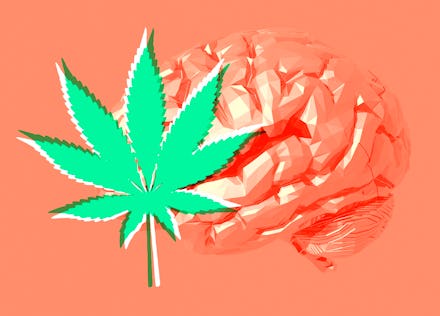Can weed make you more creative?

Cannabis has a reputation as a portal to creativity, the indulgence of choice for many an artist, writer, and musician. And honestly, I kind of get it. I’ve never attempted to create anything while high, but weed does unleash my imagination, allowing my thoughts to run rampant. During my first edible experience, I imagined myself perched on the rings of Saturn, staring into swirling galaxies and other celestial bodies, a trippy, 1960s-style harpsichord track playing in the background. At the same time, I’m unsure whether such daydreams, strange and vivid though they may be, necessarily translate to creativity. Can weed really make you more creative?
To unpack this question, I turned to an expert in the science of cannabis, Lewis Nelson, chair of the department of emergency medicine and chief of the division of medical toxicology at Rutgers New Jersey Medical School. As with many psychoactive substances, the answer is, it depends.
“There’s a lot of literature on this actually,” Nelson tells me. But “the data are fairly mixed.” Very simply put, the consensus is that non-creative people tend to be a little more creative when they consume a small dose of cannabis — people who are already creative, not so much. This makes sense, Nelson explains. “There’s kind of a plateau of creativity.” As a result, non-creative people are better poised to make steep gains while stoned than creative people who’ve already made them.
Creativity may seem like a slippery, amorphous quality, but scientists can measure it objectively in various ways. For instance, they can count the number of solutions someone came up with to a problem, a reflection of their level of divergent thinking, which is often associated with creativity, Nelson explains.
But he adds that we need to interpret the findings with the caveat that you can pretty much massage the data to show anything you want, based on how you frame the study question and run the statistics. If you wanted to show that cannabis doesn’t enhance creativity, you could give participants weed containing a high dose of tetrahydrocannabinol (THC), the compound that gets you lifted (say, around 25 milligrams). “I can assure you that people who get a very high dose of THC won’t be creative,” Nelson says. “They’ll be very sleepy and very paranoid.” Indeed, he points out that “it makes sense that low-dose cannabis in the right population”— that is, not-so-creative people — “would increase creativity.”
So to recap, based on the research so far, a low dose of cannabis could increase creativity if you're not that creative to begin with. And for now, we can say it may do so in the short term, meaning while you're using it. In studies that looked at whether routine weed use enhanced creativity long term, even when participants weren't imbibing, it’s hard to tease apart whether cannabis made people more creative, or whether creative people were more likely to use cannabis, Nelson says.
It’s worth noting that you likely perceive yourself as more creative when you’re high than an objective outside observer would, he adds. (Chicken nuggets dipped in Nutella might seem like the pinnacle of culinary genius when you’re stoned, but would probably make most sober people gag.) That’s probably the case with most psychoactive substances. Take alcohol, and how it makes some people think they’re hilarious, when they’re actually just making an ass of themselves.
And as in the case of many psychoactive substances, your headspace and surroundings — your set and setting — also matter, Nelson says. A certain dose might’ve enhanced your creativity yesterday, but didn’t do the trick today because you’re feeling more anxious, for instance. “It is a very complicated morass to really understand what’s going on in any instance.”
How does cannabis affect creativity, on a biological level? Nelson explains that it increases blood flow to brain regions associated with creativity, including the nucleus accumbens, which is involved in reward; the amygdala, involved in feelings of happiness and euphoria; and the frontal cortex, involved in emotional regulation and executive functioning. But cannabis can heighten blood flow to areas associated with paranoia and other negative emotional states, too. My first edible experience led to a plethora of fantastical daydreams — but like many newbies, I took way too much, so it also left me absolutely terrified.
Basically, cannabis may enhance creativity, but only under certain conditions and for certain people. And even then, its effects on creativity can vary from one moment to the next. Weed may be a portal to creativity, but it’s not necessarily open all the time.